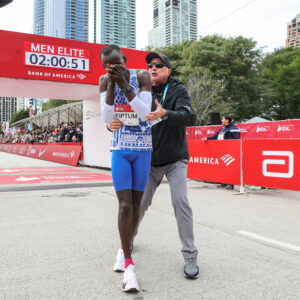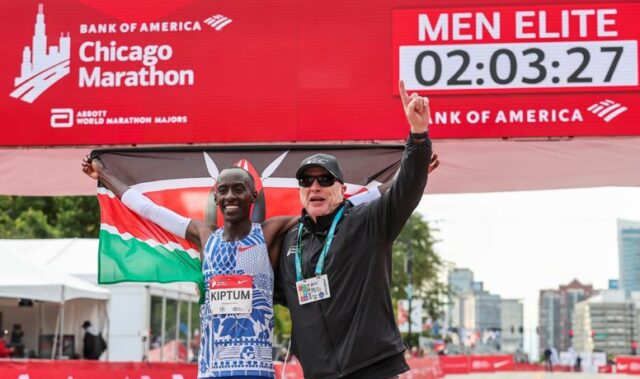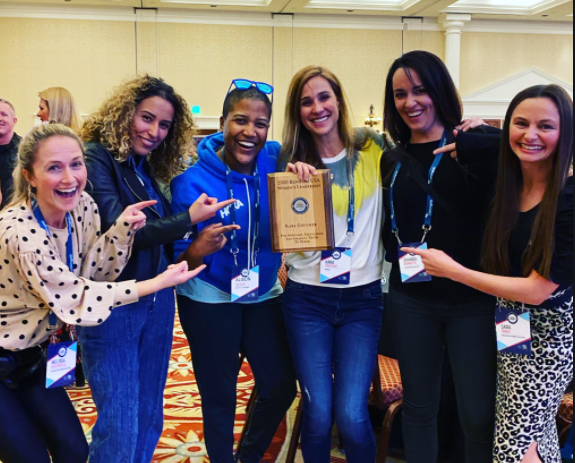When Carey Pinkowski got news that Kelvin Kiptum had been in a car accident, he didn’t let himself fear the worst. “Maybe a bruised rib,” he thought. Just four months earlier, Kiptum had leapt into Pinkowski’s arms after breaking the marathon world record at the Bank of America Chicago Marathon where Pinkowski serves as the Executive Race Director. That week, the world record had just been ratified by World Athletics. Still left to wonder what had just happened some eight thousand miles away in Kenya, Pinkowski thought, “Maybe he has to take some time off.” Moments later, Pinkowski’s phone rang. It was a friend from Nike. Kiptum and his coach Gervais Hakizamana were dead.
***
Pinkowski first saw Kelvin Kiptum at the 2023 TCS London Marathon. There, the 23-year-old Kenyan showed the world that his 2:01:53 debut marathon performance in Valencia was no fluke. That day, he would win easily in 2:01:25, the second fastest time in history. Then, the question wasn’t If Kiptum was going to break the world record, but where he was going to break it.
There for work and to watch his daughter run, Pinkowski saw Kiptum run by him at mile 15. “I turned to my wife and I go, ‘I gotta get this guy. I’ve never seen anything like it before,”’ Pinkowski recalls. “He kind of took my breath away. I was 10 yards from him. I was like, ‘holy cow, this guy is special.’”
Although known for its fast course, welcoming to pacers and generally favorable weather conditions, Chicago had not seen a men’s world record since Khalid Khannouchi ran 2:05:42 in 1999 (the women’s world record was set in Chicago by Brigid Kosgei in 2019, but has since been broken). The last eight world records, accounting for nearly four minutes of progression, had fallen in Berlin, another famously fast race held just one week before Chicago. Pinkowski knew that was his fiercest competitor to host a new men’s record. He relied on his long-time friendship with Kiptum’s manager, Marc Cortsjens, to recruit Kiptum to come to the United States.
“I think he was keenly aware of the course and the history and the tradition here. And he wanted to be part of that,” said Pinkowski. A Kenyan man had won Chicago 18 times prior to 2023 – legends like Robert Cheruiyot, Moses Mosop and Eliud Kipchoge. “There was no ‘maybe we will talk to Berlin.’ No, Chicago is where we want to go.”
If you were expecting a bidding war over appearance fees, prize money and incentives, Pinkowski says that wasn’t the case, casually referring to securing the most exciting young athlete in a generation as “easy” to work with. While Pinkowski didn’t get into specifics on elite budgets, he insisted that the top priority for his team and for Kiptum was coming to Chicago to run fast. “And then, everything kind of falls in place,” he said. The hard work was preparing the team at Chicago Event Management and the City of Chicago to potentially host a historic performance.
Although he was just 26-seconds shy of Eliud Kipchoge’s 2:01:09 after his London victory, Pinkowski says Kiptum and his team never engaged in any conversations about breaking the world record in Chicago. Kiptum, he said, simply wanted to run fast. Even at the pre-race press conference, Kiptum would only tell reporters he wanted to break the course record of 2:03:45; simple for a man who’d never run over 2:02. But Pinkowski, who’s spent more than three decades at the helm of Chicago, knew it wasn’t simply a possibility. It was the most likely outcome. He started spreading the word. In a meeting with city services, Pinkowski told police officers, emergency personnel, sanitation employees and even the Mayor’s team that Kiptum was the best he’d ever seen and he was going to break the World Record in Chicago on October 8, 2023.
In the marathon, the biggest factor that can make or break an athlete’s day is the weather, obviously beyond anyone’s control. Pinkowski was more than confident in his course. It’s responsible for three of the top five fastest women’s marathon times in history and has made Khannouchi, Steve Jones, Catherine Ndbera, Paula Radcliffe and Kosgei world record holders. In fact, in the past 40 years Chicago is one of only four marathons where world records have been set by men or women. Along with Berlin, the others are London and Rotterdam. Chicago is also where Emily Sisson set the American record in 2022.
Pinkowski points out that Chicago is an especially athlete-friendly event. Elite athlete manager Tracey Wilson is dialed in on athletes’ dietary needs, sleep schedules and race-week training requirements. She and her team focus on ensuring the last two days put as few outside pressures on the athletes as possible. That’s part of why the athlete hotel, hospitality suite and press conferences are all in the same hotel, just steps away from the start line.
“It’s about athletic competition first and foremost,” said Pinkowski. “These athletes are coming to Chicago to run a marathon. If they make history, it far exceeds anything you can create on social media or whatever. Not that we still don’t continue to do those, those are excellent, excellent tools to get our messaging out for our sponsors or information to our participants. But at the core of what we do is recognizing that there’s a lot invested in this and that we need to make sure that these guys, men and women, these individuals are in the right place.”
The Chicago team also assembled an international athlete field that would give Kiptum a chance of having people to run with. They included defending Chicago champion Benson Kipruto, Olympic and World Bronze Medalist Bashi Abdi and most notably, Daniel Mateiko, Kiptum’s rabbit in London through 30K who was now making his own marathon debut. Additionally, Wilson and Pinkowski worked with Kiptum’s team to employ a team of four pacers in case Kiptum’s pace was too quick for his competition.
Pinkowski’s bold prediction to the city served a mission critical purpose. He made the same statement to volunteers and course staff. An errant vehicle, a misplaced cone, an unprepared water stop could all cost Kiptum precious seconds and a world record for not only Kiptum, but for the city. The result was a well-oiled machine.
“It was probably one of the best organized events of all the years that we’ve done it,” Pinkowski said.
Any concerns about the weather conditions evaporated when Pinkowski stepped outside on race morning. He had been getting hourly updates from the team’s meteorologist. “They just kept getting better and better and better. Sometimes they get worse and worse and worse, but they just kept getting better,” he said. It was a dry, cloudy 46 degrees with no wind when the gun went off. “Today’s the day,” Pinkowski thought.
Kiptum made it clear he was prepared to make history in the early miles of the race. He ran his first 5K in 14:23 and by 10K, had dropped everyone except Mateiko and his pacers. The pair reached the half marathon behind world-record pace, but Kiptum lived up to his reputation of finishing fast. As he made the final turn onto Columbus Drive, Kiptum began to sprint, pumping up the already roaring crowd. By now, everyone has the finishing time memorized. 2:00:35. 34 seconds faster than Kipchoge’s record. Unable to contain his excitement, Pinkowski ran into the finish chute where Kiptum lept into his arms, an image caught by cameras from around the world.

***
After the celebration in Chicago, Pinkowski never saw Kiptum again. He had planned to travel to watch him in Rotterdam this April, where Kiptum had announced he was trying to become the first person to break the two-hour barrier in a sanctioned race.
Less than a month after Kiptum’s tragic death, Pinkowski and the city have barely had time to process his historic race let alone his unexpected passing. At the time of this interview, he had just returned from the Tokyo Marathon where he said dozens of Americans came up to him to offer condolences and share their disbelief. In Chicago, everyone from race spectators to Mayor Brandon Johnson have reached out to Pinkowski and the CEM team.
“Kelvin put Chicago front and center in that we can break world records here. The residual effect of that kind of reenergized our team. It reenergized me,” Pinkowski said. “I mean, he really connected us, because we were all part of building this thing. It’s still resonating.”
***
Author and interviewer Jay Holder is the Executive Director of Running USA. Photo credits: Kevin Morris.




